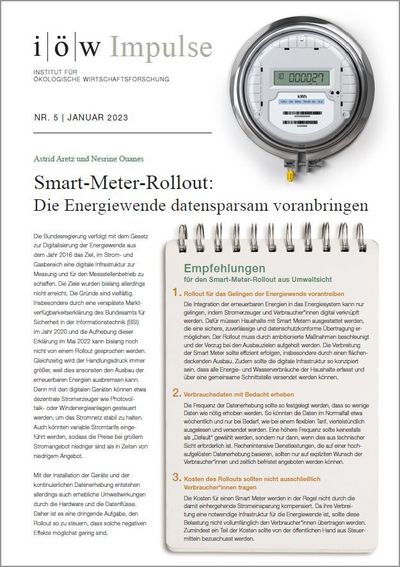Smart meter rollout: Advancing the energy transition in a data-saving way
Smart meters are an important prerequisite for the energy transition to move forward. But the rollout of these so-called smart meters is stalling. A new law to relaunch the digitization of the energy transition, for which the German Federal Ministry of Economics and Climate Protection (BMWK) presented a draft law in December 2022, is now expected to bring about a breakthrough. The IÖW has investigated the ecological impact of the extensive expansion and operation of smart meters.
In the future, smart meters will help to optimally adjust electricity consumption in households to the fluctuating supply of wind and solar energy. They will also make it easier to save electricity. However, the meters themselves consume electricity, primarily for data collection, processing and transfer, and the production of the hardware is associated with negative environmental impacts. At the same time, an analysis of consumption data from 1,600 households shows that the installation of a smart meter has not yet led to any significant electricity savings. Accordingly, the relevant negative environmental effects of the rollout cannot yet be compensated for by savings. However, to keep these as low as possible, a well-thought-out rollout is needed in which maximum savings are achieved through efficient installation, and a data-saving strategy is needed in which the negative effects of the devices are kept to a minimum.
Recommendations for the smart meter rollout from an environmental perspective
1. Promote the rollout for the success of the energy transition
The integration of renewable energies into the energy system can only succeed by digitally linking electricity producers and consumers. To this end, households must be equipped with smart meters that enable secure, reliable and data-protection-compliant transmission. The implementation of the rollout targets must be accelerated through ambitious measures. The smart meters should be distributed efficiently, in particular through nationwide expansion.
2. Collect consumption data with wisely
The frequency of data collection should be set so that as little data as necessary is collected. For example, data could normally be read out and sent on a weekly basis and only when necessary, as in the case of a flexible tariff, on a quarter-hourly basis. A higher frequency should not be selected as the default under any circumstances, but only if this is necessary from a technical point of view or is desired by the consumers.
3. The costs of the rollout should not be borne exclusively by consumers
The costs for a smart meter, which have to be borne by households, are generally not compensated by the associated electricity savings. Since their deployment is a necessary infrastructure for the energy transition, this burden should not be fully transferred to consumers. At least part of the costs should be subsidized by the public sector from tax revenues.



